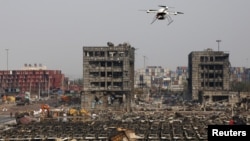The well-connected owners of a warehouse that exploded in the northeastern Chinese port city of Tianjin last week used their relationships with officials to obtain apparently fraudulent safety licenses, according to state media.
The corruption allegation, which surfaced Wednesday, is likely to prompt further outrage over the explosion, which killed 114 people and injured hundreds more.
Ex-Sinochem executive Yu Xuewei and Dong Shexuan, the son of a late police chief, are the top shareholders of Ruihai International Logistics, which owned the Tianjin warehouse where the explosion occurred.
In an interview with the official Xinhua news agency, Dong and Yu admitted to using their connections, or guanxi, with local officials to obtain "various fire safety, land, environmental and safety certifications."
"My guanxi are in police and fire. When we needed a fire inspection, I went to meet with officials at the Tianjin port fire squad. I gave them the files and soon they gave me the appraisal," said Dong.
According to Xinhua, Dong and Yu also attempted to hide their ownership in the company, listing their friends and relatives as shareholders instead of themselves.
The men are among ten Ruihai officials detained by police, as authorities look into the apparently lax safety standards that contributed to the explosion.
The People's Daily reported last week that Ruihai had operated without a license to work with dangerous chemicals because of an administrative loophole.
On Tuesday, China's anti-graft watchdog said the head of the country's work safety regulator is under investigation for allowing companies to operate without a license to handle toxic chemicals.
The Central Commission for Discipline Inspection said Yang Dongliang, who headed up the State Administration of Work Safety, is being investigated for suspected violations of party discipline and the law. It did not say if his activities led to the explosion.
Another issue being probed by investigators is why the warehouse was storing dangerous chemicals, when it was located only about 560 meters away from residential housing. Regulations state that such a facility must be at least 1,000 meters away from major transport hubs and public buildings, according to Xinhua.
Authorities say some 3,000 tons of hazardous materials, including sodium cyanide and potassium nitrate, were stored at the site at the time of last week’s massive blasts. Tests by environmental authorities around the blast site have detected higher than normal levels of sodium cyanide at eight stations, one of which was 27 times above the national standard.
None of the readings that were above normal were in residential areas or outside the three-kilometer zone around the blast site, officials said Tuesday.





